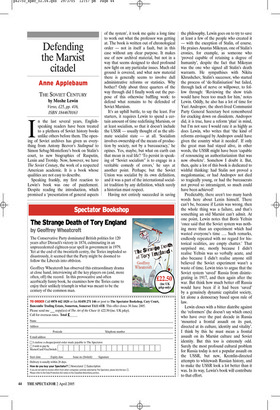Defending the Marxist citadel
Anne Applebaum
THE SOVIET CENTURY by Moshe Lewin Verso, £25, pp. 416, ISBN 1844670163 In the last several years, Englishspeaking readers have been treated to a plethora of Soviet history books unlike others before them. The opening of Soviet archives has given us everything from Antony Beevor’s Stalingrad to Simon Sebag-Montefiore’s book on Stalin’s court, to new biographies of Rasputin, Lenin and Trotsky. Now, however, we have The Soviet Century, the work of a respected American academic. It is a book whose qualities are not easy to describe.
Speaking frankly, my first reaction to Lewin’s book was one of puzzlement. Despite reading the introduction, which promised a ‘presentation of general aspects of the system’, it took me quite a long time to work out what the professor was getting at. The book is written out of chronological order — not in itself a fault, but in this case without any clear purpose. It makes use of new archival material, but not in a way that seems designed to shed profound new light on any particular issues. Much old ground is covered, and what new material there is generally seems to involve dull administrative reforms or statistics. Why bother? Only about three quarters of the way through did I finally work out the purpose of this otherwise baffling work: to defend what remains to be defended of Soviet Marxism.
It’s an uphill battle, to say the least. For starters, it requires Lewin to spend a certain amount of time redefining Marxism, or at least socialism, so that it doesn’t include the USSR — usually thought of as the ultimate socialist state — at all. ‘Socialism involves ownership of the means of production by society, not by a bureaucracy,’ he opines. Yes, maybe, but what on earth can that mean in real life? ‘To persist in speaking of “Soviet socialism” is to engage in a veritable comedy of errors,’ he says at another point. Perhaps; but the Soviet Union was socialist by its own definition, and it was a part of the international socialist tradition by any definition, which surely a historian must respect.
Having not entirely succeeded in saving the philosophy, Lewin goes on to try to save at least a few of the people who created it — with the exception of Stalin, of course. He praises Anastas Mikoyan, one of Stalin’s cronies, for example, as someone who ‘proved capable of retaining a degree of humanity’, despite the fact that Mikoyan was the one who signed all Stalin’s death warrants. He sympathises with Nikita Khrushchev, Stalin’s successor, who started the process of ‘de-Stalinisation’ but failed, through lack of nerve or willpower, to follow through: ‘Reviewing the show trials would have been too much for him,’ notes Lewin. Oddly, he also has a lot of time for Yuri Andropov, the short-lived Communist Party General Secretary best remembered for cracking down on dissidents. Andropov did, it is true, have a reform ‘plan’ in mind, but I’m not sure I would rate it as highly as does Lewin, who writes that ‘the kind of reforms envisaged by Andropov could have given the country what it needed’. If only the great man had stayed alive, in other words, the USSR might have been ‘capable of renouncing an authoritarianism that was now obsolete’. Somehow I doubt it. But, then, quite a lot of this book is dedicated to wishful thinking: had Stalin not proved a megalomaniac, or had Andropov not died so tragically young, or had the bureaucrats not proved so intransigent, so much could have been achieved!
Predictably, there aren’t too many harsh words here about Lenin himself. There can’t be, because if Lenin was wrong, then the whole thing was a failure, and that’s something an old Marxist can’t admit. At one point, Lewin notes that Boris Yeltsin ‘once said that the Soviet system was nothing more than an experiment which had wasted everyone’s time .... Such remarks, endlessly repeated with no regard for historical realities, are empty chatter.’ That surprised me, mostly because I didn’t realise Yeltsin was so verbally acute, and also because I didn’t realise anyone still believed the Soviet experiment wasn’t a waste of time. Lewin tries to argue that the Soviet system ‘saved’ Russia from disintegrating in 1917, and then again after the war. But think how much better off Russia would have been if it had been ‘saved’ by a genuinely dynamic capitalist society, let alone a democracy based upon rule of law.
Lewin closes with a bitter diatribe against the ‘reformers’ (he doesn’t say which ones) who have over the past decade in Russia ‘mounted a frontal assault on its past, directed at its culture, identity and vitality’. I think by this he must mean a frontal assault on its Marxist culture and Soviet identity. But this too is extremely odd. Surely the most profound cultural problem for Russia today is not a popular assault on the USSR, but new, Kremlin-directed attempts to whitewash Russian history, and to make the USSR look a lot better than it was. In its way, Lewin’s book will contribute to that effort.





























































 Previous page
Previous page